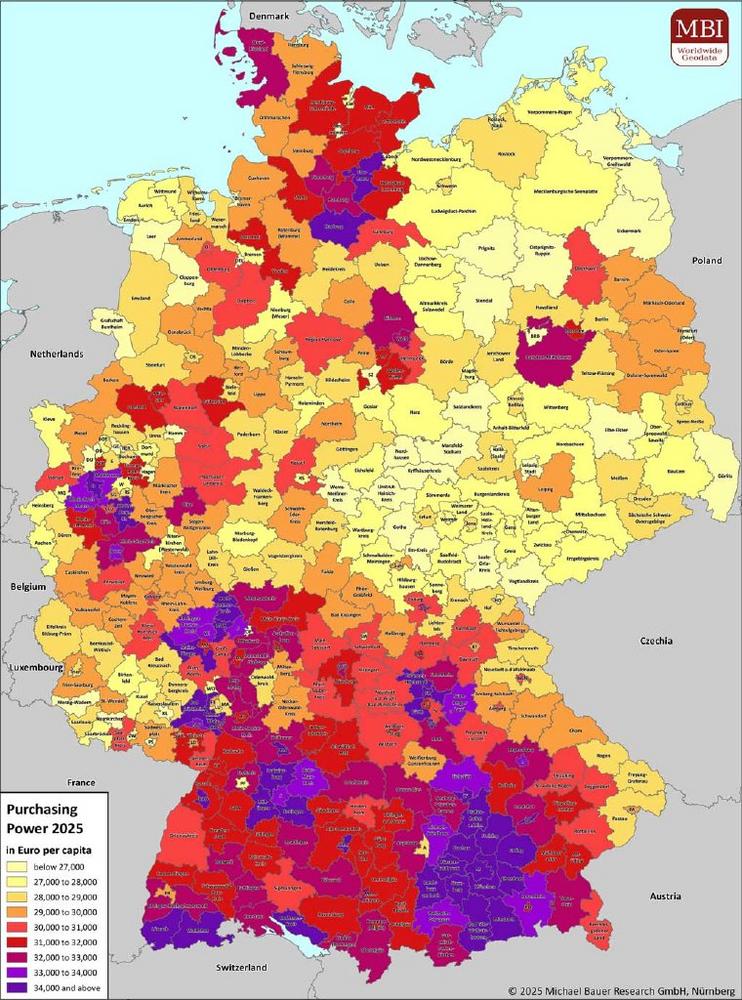Purchasing Power in Germany to Exceed €2,558 Billion in 2025

Breaking News:
Donnerstag, Dez. 18, 2025

These and other figures are taken from the latest release of MBI purchasing power data. They provide users from various industries with a reliable basis for further analysis and interpretation To determine real purchasing power, in addition to MBI’s nominal data, the rise in consumer prices must also be taken into account. The following offers an overview of key indicators from MBI’s dataset: What regional disparities and shifts are emerging in 2025—and which states and districts stand out?
Germany’s Purchasing Power Mapped
A first glance at the 2025 per capita purchasing power distribution is provided in this map of Germany, based on MBI data.
(Image 1)
Federal States by Purchasing Power Index
The top five German states by purchasing power index remain unchanged from 2024:
(Image 2)
* Per capita purchasing power index; 100 corresponds to the national average
Bavaria leads the ranking with the highest per capita purchasing power at €33,402 and an index of 109. It is followed by Hamburg, Baden-Württemberg, Hesse, and Schleswig-Holstein. Only four of Germany’s 16 federal states exceed the national average, meaning three-quarters fall below it.
East-West Disparities in Purchasing Power
A direct comparison reveals that regional differences between Eastern and Western Germany persist. In 2025, per capita purchasing power in the eastern states (new states of Germany) is €27,855, while in the rest of Germany it is €31,024. Per capita purchasing power is growing at the same rate in both parts of the country, at 1.9 %, and will therefore not change the existing differences in 2025. In addition, population in the new states is slightly declining (-0.2 %), while the old states see a modest increase (+0.3 %).
(Image 3+4)
States with the Highest Purchasing Power Growth
Overall, Germany continues to show solid, if slightly slower, growth in purchasing power for 2025. All federal states report increases in per capita values, though at varying rates. The strongest year-over-year growth is seen in:
(Image 5)
* 2024 to 2025 based on € per capita
Mecklenburg-Western Pomerania, a state in Eastern Germany, ranks second to last in terms of purchasing power. However, it is catching up, with the highest rate of change of all federal states (2.2 %).
Top 5 Districts and Cities by Purchasing Power
(Image 6)
* Per capita purchasing power index; 100 corresponds to the national average
Starnberg district continues to have the highest per capita purchasing power of all districts and independent cities in Germany. With a purchasing power index of 149, it stands well above the national average. Interestingly, four of the five top-ranking districts are located in Bavaria, which also has the highest average per capita purchasing power among the federal states. The only district in the top five outside Bavaria is Hochtaunuskreis, ranked third, located near the financial hub of Frankfurt am Main.
Licensing the 2025 Germany Purchasing Power Data
MBI is pleased to announce that the 2025 purchasing power data for Germany is now available – a carefully prepared data foundation for well-informed, strategic decisions.
The purchasing power figures are based on forecast values determined with consideration of current macroeconomic trends and regional statistical indicators. One of the key sources is the Joint Economic Forecast (Gemeinschaftsdiagnose) issued by Germany’s leading economic research institutes in spring 2025.
Our purchasing power data follows globally consistent standards, making it not only highly accurate but also internationally comparable — an essential tool for organizations operating in multiple markets.
Applications and Additional Purchasing Power Metrics
MBI’s 2025 purchasing power data for Germany is used by companies across a wide range of industries—for market analyses, site evaluations, and marketing planning. The data is well suited for gaining an overview of disposable income by region. Depending on the industry and specific goals, it can be worthwhile to take a closer look at more targeted purchasing power indicators, which may differ from general purchasing power values. These include, for example, retail spending, online purchasing power, consumer spending by product group, and others.
Feel free to contact our sales team – our experts will be happy to provide you with personalized, no-obligation advice on how to create added value and achieve cost savings for your business with the right data.
Being a specialist for small-scale data for Geomarketing, Michael Bauer International has grown to one of the largest global data providers for over ten years. MBI unites passion and scientific know-how to provide globally consistent and comparable geographic, market, and risk data.
Today MBI is not only recognized as a key data source but is also the preferred data provider for the largest leading GIS software and technology companies globally. For a vast variety of companies, MBI’s data is the foundation for location-based questions related to company locations, as well as branch and distribution networks. MBI mobile data offers valuable insights into the global consumer behavior and their customer journey. Companies from all industries are supplied with up-to-date data for market analyses and visualization by MBI, to take informed and data-based decisions.
With CONIAS Risk Intelligence, we provide in-depth and data-driven information about the current and emerging dynamics of political conflicts worldwide. We support internationally operating companies and organizations in identifying political risks to location, logistics, and investment security at an early stage and in developing targeted adaptation strategies.
MBI is one of the first global HERE Technologies Distributors. HERE is the leading provider in the development of digital maps and location-based services.
Both Michael Bauer Research GmbH and Michael Bauer Micromarketing GmbH are part of the Michael Bauer Group.
For more information, please visit www.mbi-geodata.com
Michael Bauer International GmbH
Greschbachstr. 12
76229 Karlsruhe
Telefon: +49 (721) 1618566
Telefax: +49 (721) 94540496
http://www.mbi-geodata.de
![]()